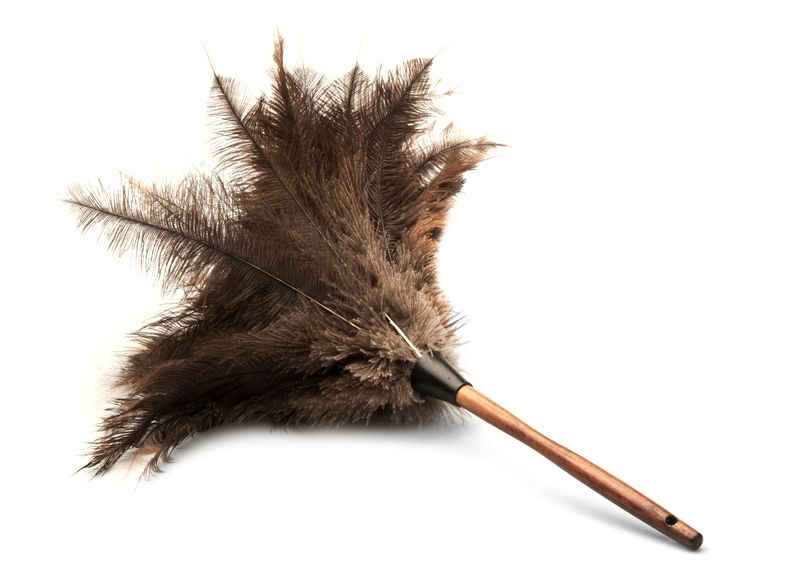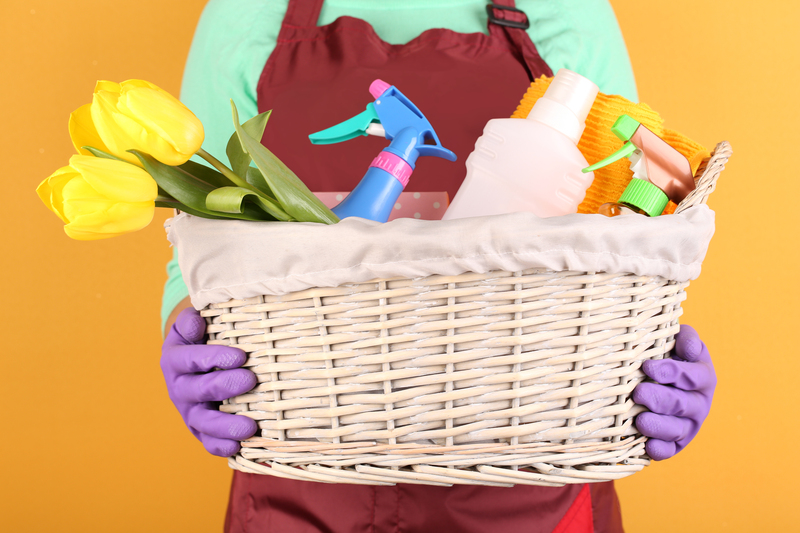Curtain Cleaning Tips from the Pros
Posted on 26/05/2025
Curtain Cleaning Tips from the Pros: Achieve Spotless Drapes at Home
Curtains are essential home decor elements--they add personality, style, and comfort to a room. However, they also act as dust magnets, trapping allergens, odors, and dirt over time. Regular curtain cleaning is crucial not just for appearance, but also for maintaining indoor air quality. In this detailed guide, industry professionals share their top curtain cleaning tips to help you revive your drapes and extend their lifespan.

Why Regular Curtain Cleaning Matters
Curtains accumulate a surprising amount of dust, pollen, pet dander, and even mold spores. Neglecting to clean your curtains can lead to:
- Unpleasant odors lingering in your living space
- Allergen buildup, aggravating asthma and allergies
- Stained and faded fabrics
- Premature fabric deterioration
Maintaining spotless, fresh curtains is easier than you might think when you follow these professional curtain cleaning tips.
Understanding Curtain Fabrics: Know Before You Clean
Not all curtains are created equal! The fabric determines which cleaning methods you should use. Before applying any curtain cleaning method, always check the care label for manufacturer guidelines.
- Cotton and Linen: Usually machine washable on a gentle cycle, but may shrink if not handled correctly.
- Silk and Velvet: Delicate fabrics, best cleaned by professional curtain cleaners.
- Polyester and Synthetic Blends: Tougher fabrics, commonly suitable for machine washing or steaming.
- Sheers and Lace: Require extremely gentle handling and should be hand-washed or placed in a mesh bag for a delicate cycle.
Tip: Test any cleaning solution on a hidden area of the curtain before treating the whole panel.
How Often Should You Clean Curtains?
According to curtain cleaning experts, the frequency depends on your environment:
- Standard Households: Every 3-6 months for thorough cleaning.
- Homes with Pets or Smokers: Every 2-3 months.
- Allergy Sufferers: Once a month or more frequently to reduce allergen load.
- Kitchens or Humid Areas: Every 2-3 months due to grease and moisture buildup.
Pre-Cleaning Curtain Care: The Basics
Before deep cleaning, professional curtain cleaning services recommend regular maintenance to minimize dust buildup:
- Vacuuming Curtains: Use a vacuum with a soft brush attachment. Work top-down, focusing on pleats and folds.
- Gentle Shaking: Take the curtains outside occasionally and shake off loose dust and dirt.
- Brushing: A soft-bristled clothes brush can help lift dust from delicate or heavy fabrics.
- Spot Cleaning: Immediately blot spills with a clean, dry cloth. Treat stains promptly using an appropriate stain remover for the fabric type.
DIY Curtain Cleaning Methods for Every Fabric Type
Machine Washing Curtains: Step-by-Step
- Remove Hardware: Take down all hooks, rings, and removable heading tapes.
- Pre-Treat Stains: Gently apply stain remover on problem areas and let it sit for a few minutes.
- Use a Gentle Cycle: Set your washing machine to the delicate or gentle cycle with cold water.
- Mild Detergent: Use a small amount of gentle, bleach-free detergent.
- Air Dry: Hang curtains immediately after washing to prevent creases. Avoid direct sunlight to stop colors from fading.
Tip: Never overload the washing machine--wash curtains in batches if needed to avoid stretching or tangling.
Hand Washing Delicate Curtains
- Fill a large basin or bathtub with cold water and mild detergent.
- Submerge the curtains and gently agitate them by hand.
- Rinse thoroughly in clean water, repeating until no soap remains.
- Press out excess water (do not wring) and hang to dry.
Steam Cleaning Curtains
- Perfect for heavy or delicate fabrics that aren't suitable for washing.
- Use a handheld steamer on low heat, running it over the fabric from top to bottom.
- Maintain a distance of about 1-2 inches from the material to avoid water spots.
- Allow curtains to fully air dry while hanging.
Pro Tip: Steam cleaning not only removes dirt but also eliminates bacteria, mites, and lingering odors.
Dry Cleaning Curtains
When you see a "dry clean only" label, don't take chances. Delicate materials like silk, brocade, and velvet often require professional curtain cleaning services. Some experts offer pick-up and delivery, taking the hassle out of maintaining luxury drapes.
Spot Cleaning Tricks from Curtain Cleaning Experts
- Blot, never rub, stains with a clean cloth to avoid spreading.
- For food or grease, sprinkle cornstarch or baking soda to absorb oil, then brush away and dab with diluted detergent.
- For ink stains, press with a paper towel and gently apply rubbing alcohol before washing.
- Address pet accidents by blotting, then treating with an enzymatic cleaner designed for fabrics.
Special Curtain Cleaning Challenges and Solutions
Dealing with Mold and Mildew on Curtains
- Take curtains outdoors to dust off as much mold as possible.
- Mix a solution of one part vinegar to four parts water and gently dab onto moldy spots.
- Launder as per fabric instructions. Sun-drying also helps kill remaining mold spores.
Eliminating Persistent Odors
- Spritz curtains lightly with a fabric refresher or diluted vinegar.
- Leave windows open to encourage air circulation and freshen curtains before rehanging.
- Baking soda sprinkled and vacuumed off can help absorb musty smells (ensure compatibility with fabric first).
Ironing Tips for Wrinkle-Free Curtains
- Iron curtains while slightly damp for smoother results (unless the care label forbids it).
- For delicate fabrics, place a cotton sheet between the iron and curtain or use a garment steamer.
- Hang curtains immediately after ironing to "set" the crispness.
Professional Curtain Cleaning vs. DIY: When to Call the Pros
While at-home methods work well for most situations, certain circumstances call for professional curtain cleaning:
- Heavily Soiled or Stained Curtains: Professionals use steam extraction, proprietary solutions, and specialized machinery for deep cleaning and fabric protection.
- Large, Heavily Lined, or Interlined Drapes: These can be very heavy and prone to distortion--experts know how to treat them safely.
- Delicate or Expensive Materials: Silk, velvet, brocade, and designer or antique curtains should always be handled by pros.
- Smoke, Water, or Mold Damage: Curtain cleaning specialists have treatments for restoring curtains affected by smoke or water.
Hiring a reputable curtain cleaner ensures thorough results and prolongs your drapes' beauty and durability.
Curtain Maintenance Tips to Minimize Cleaning
Keep Your Curtains Fresh Between Washings
- Regularly dust window sills and surrounding areas to reduce airborne particles that settle on curtains.
- Open windows when possible to air out curtains and prevent humidity buildup.
- Use tie-backs and valances to minimize direct handling and reduce stains and fabric oil absorption.
- Rotate your curtains seasonally to balance out exposure to light and wear.
- Replace or clean linings separately to keep the main fabric cleaner for longer.
Storing Curtains Properly
- Store clean, dry curtains in a breathable cotton bag or wrapped in a sheet.
- Avoid plastic storage, which can trap moisture and cause yellowing or mildew.
- Fold loosely or roll to avoid hard creases.
- Store in a cool, dry place away from direct sunlight.

Frequently Asked Questions About Curtain Cleaning
Can All Curtains Be Washed in a Machine?
No. Always check the care label first. Some curtains, especially those made of silk, velvet, or with special finishes, are "dry clean only." Machine washing these could cause permanent damage.
How Do You Remove Stubborn Stains?
Blot with a clean, damp white cloth. Use an appropriate stain remover for the kind of fabric and stain, such as enzyme cleaner for food or pet stains, or diluted alcohol for ink. Test on a hidden area before treating a visible spot.
Is Steam Cleaning Safe for All Curtain Types?
Steam cleaning is safe for most fabrics except extremely delicate materials like silk or those with glued embellishments. Always start with a small patch test and maintain adequate distance with the steamer head.
How Do Professionals Clean Curtains On-Site?
Many professional curtain cleaners offer on-site services using specialized steam extraction equipment and eco-friendly cleaning solutions, so you can refresh your curtains without taking them down.
Conclusion: Enjoy Pristine Curtains with These Expert Tips
Regular curtain cleaning is vital for a healthy, fresh, and inviting home. By following these top tips from pros--knowing your fabric, choosing the right cleaning method, and maintaining curtains well between washes--you'll prolong the life of your drapes and improve your indoor air quality. Whether you choose to tackle routine cleaning yourself or trust a professional for deeper expertise, your efforts will pay off with beautiful, odor-free, and vibrant window treatments.
Bonus: Remember
- Always read the manufacturer's care instructions.
- Start with gentle cleaning methods before progressing to more intensive solutions.
- Keep cleaning supplies on hand for spills and stains.
Ready for spotless curtains? Try these curtain cleaning tips from the pros and enjoy the transformation in your home today!




